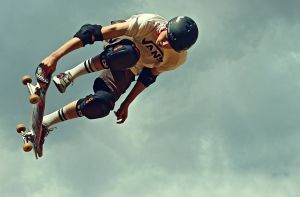Skateboarding Makes its Olympic Debut

The Olympic Games is more than 2000 years old, but it tries to give us something fresh every time. In the 2020 Tokyo Games (delayed to 2021 due to the global coronavirus pandemic), there are four new sports. They are karate, surfing, sport climbing, and skateboarding.
Among the newcomers, skateboarding is the youngest, having been invented in the United States in the 1940s or 1950s. It was initially known as ‘sidewalk surfing’ and grew to be especially popular in California, where the ocean surfing culture was already strong.
Skateboarding has struggled at times to be recognized as a sport or even as a positive influence on young people. People have complained that skateboarders are dangerous when they practice tricks at rapid speeds on busy streets where people are walking. At the same time, people have claimed purpose-built skate parks are places where teenagers get into drugs and other bad habits.
However, the debut of skateboarding at the Olympics is changing the way some people think about the sport. For one thing, some of the competitors in skateboarding are young to be reaching the pinnacle of the sport. The gold and silver medalists in the women’s ‘street’ event are both 13 years old. On the other hand, two of the male skaters are 46 years old. One of those 46-year-olds is South African Dallas Oberholzer, who began skateboarding in the 1980s. Oberholzer, who is white, says skateboarding helped him make black friends and get over his apartheid upbringing. For Oberholzer, being in the Olympics is also good because it is the first time his mother has been impressed by his skateboarding.
Sources: apnews.com, wikipedia.com, wikipedia.com
For source links, see the article on ESLNewsStories.com
Audio
Hear the article spoken:
Useful Language
- Debut (n) - the first appearance of something in public
- Delay (v) – to make something happen later
- Newcomer (n) – someone or something that has recently arrived
- Invent (v) – to create something for the first time
- Struggle (v) - to try hard to do something even though it’s difficult
- Trick (n) – a skilled action that somebody does to entertain or impress
- Rapid (adj) - quickly
- Pinnacle (n) – the highest point, the point of greatest success
- Apartheid (n) – a political system in which white people have power over black people
- Upbringing (n) – the way a child is cared for and taught how to behave while it is growing up
- Purpose-built (adj) – designed and built for a specific purpose
Discussion
Discuss the following questions with your partner(s).
- What sports does your country do well in?
- Which of the new Olympic sports is most interesting to you?
- Is skateboarding a real sport or is there something different about it? If you think it’s different, try to explain what is different.
- What do you think when you hear a 13-year-old won a gold medal?
- Why is it important for young people to be physically active?
- If you were in the Olympics, which sport would you be doing?
- Have you ever felt skateboarders were being dangerous near you?
- Skateboarders seem to fall often. Could you do a sport in which you often got injured?
- What advantages or disadvantages does a 46-year-old athlete have in comparison with a 13-year-old athlete?
- How do sports help us to connect with people who are different?